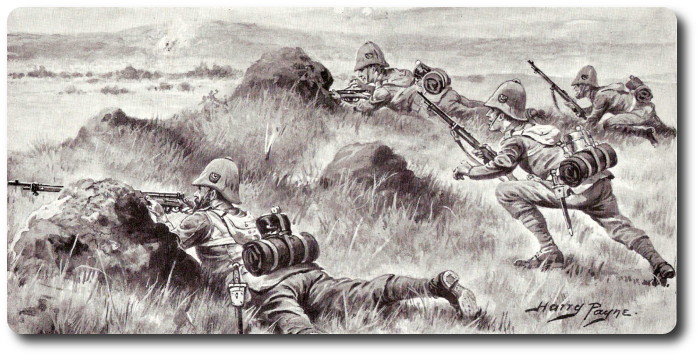Topic: The Field of Battle

An Avoidable Death, South Africa
With the Royal Canadians, Stanley McKeown Brown, 1900
For the first time the seriousness of the actual campaign broke on the Canadian regiment, and again the next day as a sad and impressive funeral cortege wended its way out over the sandy veldt, …
Two nights sufficed for the Canadians at Orange River, during the first of which a very sad shooting accident occurred in the Shropshire regiment, which was lying side by side with our men and which battalion was at a future date to form part of the now famous 19th Brigade along with the Royal Canadians.
The country around for miles was strongly patrolled at night and every precaution was taken to keep the Boers from taking our little garrison by surprise.
 Out into the dark night the Shropshires sent a heavy picket with instructions to the men to be very careful to challenge every person who might come in or out of camp. At the foot of a kopje one of the men of the Shropshires stood on sentry, another private of the same regiment was returning to camp. The sentry promptly challenged, "Halt! who comes there?" and failing to call "Friend," the returning soldier said, "Oh, to you know me." These were fatal words, for no sooner had they been spoken when three ringing shots sounded through the Orange River garrison, three steady shots from the sentry's rifle, and his companion-in-arms fell, never to rise to life again. It was an unfortunate occurrence which cast gloom over the whole camp, but it shows that the rigidity of military discipline should not be trifled with.
Out into the dark night the Shropshires sent a heavy picket with instructions to the men to be very careful to challenge every person who might come in or out of camp. At the foot of a kopje one of the men of the Shropshires stood on sentry, another private of the same regiment was returning to camp. The sentry promptly challenged, "Halt! who comes there?" and failing to call "Friend," the returning soldier said, "Oh, to you know me." These were fatal words, for no sooner had they been spoken when three ringing shots sounded through the Orange River garrison, three steady shots from the sentry's rifle, and his companion-in-arms fell, never to rise to life again. It was an unfortunate occurrence which cast gloom over the whole camp, but it shows that the rigidity of military discipline should not be trifled with.
For the first time the seriousness of the actual campaign broke on the Canadian regiment, and again the next day as a sad and impressive funeral cortege wended its way out over the sandy veldt, the men from our Dominion saw in reality a dark side which to them was new, and attended with a solemnity which was doubly solemn on the sands of Africa.
To slow music with bayonets fixed and arms reversed the creeping kharki procession passed by the lines of the Royal Canadians, and a hush came on the camp. Then it was that many a man shuddered as he thought of a burial in South Africa, thousands of miles from where any of his friends could ever see his grave or ever plant a flower on his last resting place.
There are times at war when one is pensive and reflective, that is when one sees a comrade buried with all the impressive ceremony of a military funeral. When the muffled drums resound but to a slow dirge; when the gun carriage with its gloomy coffin load, wrapped in a Union Jack death pall, lumbers along to a waiting grave, unsympathetically jolting the soldier on the way to his last lone bed. Sorrow is written on the faces of every rugged and sunburnt man of arms, as with reluctant steps he nears the burial place of his lost companion. The funeral notes of the mournful music have the effect of striking into a living man's soul a deep hatred of death in a foreign clime. The sand or limestone "six feet of earth," on a South African field, seems but a mean mockery of a proper grave; the shallow bed seems too short for that last long sleep, too narrow for a quiet rest of such duration as it is bound to be. The sewn-up blanket in which the soldier is shrouded makes at times but a poor, scanty apology for the sound coffin one is used to seeing on such occasions in peace time. The spades of earth thrown in on the human form as it bulges in the blanket seems a scarce sepulchre; the volleys from the muzzles of the rifles over the grave are like empty messages to the dead, and the quivering "last post," which the bugles blast over the silent mound after the burial service, are but a brazen farewell to the soldier as he lies free from the care of campaign, "where the wicked cease from troubling and the weary are at rest."
Then, according to military custom, the burial party starts from the lonely spot, and, where they before had come marching to slow music, the band at once strikes up a quickstep, and as if tired of the tedium of the service, swing with a dashing air back to the camp, till Death's hand beckons another fighter home, and the dead marches are again called into requisition.

